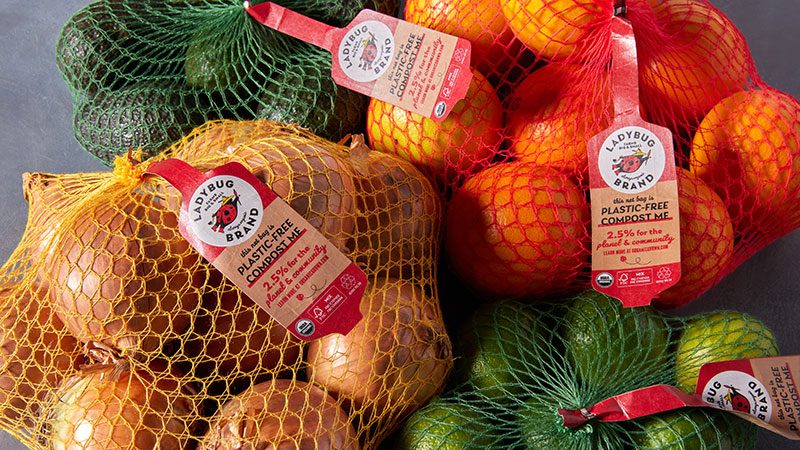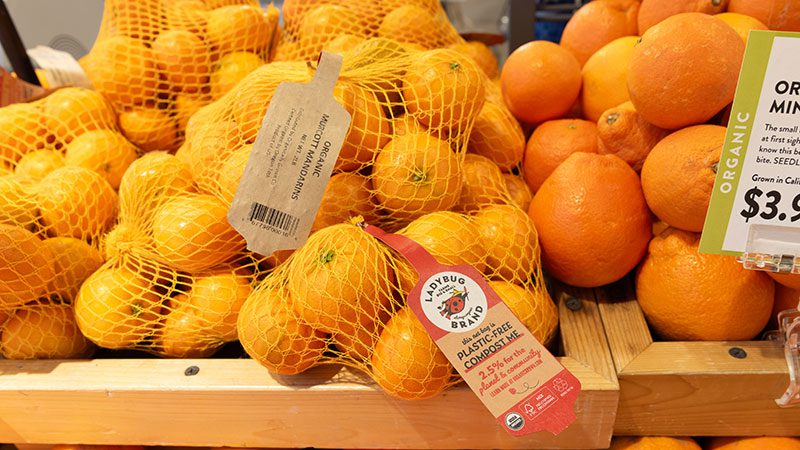New compostable mesh produce bag cuts plastic use

A new replacement for plastic packaging should make PCC’s produce section more sustainable.
“The main feedback we get in produce from our shoppers is “Less plastic. We want to see less plastic,” said produce merchandiser Elliott Lamoureux. “This is going to be a great solution for that.”
The latest advance is a compostable mesh produce bag being piloted at PCC stores through Organically Grown Company, a Portland-based distributor and major PCC supplier.
PCC was already increasing the amount of produce bagged in-house in paper tote bags, Lamoureux said, but those totes aren’t feasible for every product or producer.
The compostable bags replace the plastic mesh previously used for bagged avocadoes, Brussels sprouts, lemons, limes, tangerines, naval oranges, yellow onions, and two types of baby potatoes. Soft to the touch, the bags are made in Austria and woven from beechwood that’s been sourced from FSC-certified forests there. The wood comes from trees thinned for fire management, said Joey Staub, OGC’s product innovation manager. “They are coming from naturally occurring forests, they’re not being grown on tree farms, and it’s just part of the forest management system.”
If the same bags had been in use last year, it would have saved well over 100,000 plastic bags through PCC alone. If the pilot succeeds, PCC also hopes to use the bags in its Farm-to-School bagged apple collaboration with OGC, where proceeds from 3-pound bags of Fuji apples benefit local school programs.
A plastic packaging alternative
Staub and colleagues found the new option when attending the “Fruit Logistica” conference in Berlin, one of the world’s largest produce conferences, looking for innovations they could use in the United States. The European Union is “where the primary development for a lot of the sustainable packaging is happening,” Staub said, due to EU laws mandating reductions in single-use plastics.
There, they met manufacturers of the packing machine that uses compostable mesh, and saw how it was used overseas. “This is a widely-used product in Europe,” Staub said, and seeing it succeed in large-scale retail programs there made them confident it would work for them too.
Why wasn’t it already used widely in the U.S.? Cost is a big reason — not just the machinery, but the compostable bags, which cost three to four times more than plastic.
“The reason we see so much of the (plastic) poly mesh here is because it’s incredibly cheap. That’s what the market has been based on, is this really inexpensive material. This (compostable) material is more expensive than poly, but that feels OK for us,” Staub said.
It’s about more than money. Staub said when he’s opened plastic bags at home in recent years he’s thought about the dangers and unknowns of microplastics, what they might mean for his child, for his pet, for the environment. Opening a compostable bag of avocadoes recently, he said, “I don’t have that sense of dread washing over me.”
There’s “a decent learning curve” to launch the program, and PCC’s pilot is part of that. It’s the largest outlet for the bags, also being piloted at Skagit Valley Food Co-op, making their Northwest debut. (OGC has smaller trials at the Boise Co-op in Idaho, Good Earth Natural Foods in California, and Ashland Food Co-op in Oregon.)
OGC started “relatively small,” he said, with the company purchasing a semi-automatic bagger where humans are still working on the processing line.
“There’s no plastic from the supplier at all,” he said. The mesh comes in a compressed length of material wrapped in paper. Workers attach the mesh to the machinery, produce is weighed by an electronic scale and distributed through a tube into the net, and people at the other end take the bag, check for quality and staple it. The bag is compostable, the tag is made from FSC-certified paper and is recyclable, two small metal clips go in the trash.
Technically the bags can be recycled as textiles. “When you look at it closely, it almost looks like crocheted yarn,” said Amy Brown, an OGC spokeswoman. Plant cellulose is made into a fiber that is then woven into a soft net.

Disposing of compostable packaging
A European Union body, Din Certco, has certified that the bags will break down in home compost bins, and they are widely composted in the European Union. A U.S. certifier, BPI, has certified them for industrial composting, though different municipalities vary on what they will accept in curbside composting bins. OGC is currently seeking testing through the Cedar Grove, to certify they meet its standards for how fast and how completely compostable products break down.”
As the pilot continues, Brown said, OGC appreciates getting feedback and figuring out if any changes are needed and what other fruits and vegetables would be appropriate to switch.
“We’re just trying to get everything that makes sense in a bag into this bag,” Staub said.
